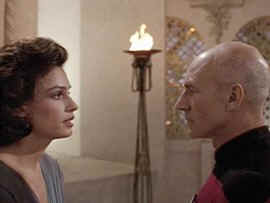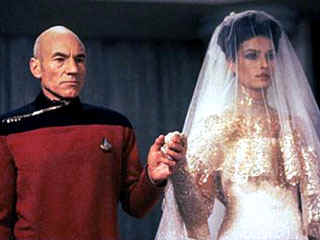|
home | what's new | other sites | contact | about |
||
|
Word Gems exploring self-realization, sacred personhood, and full humanity
Kamala and Picard
beauty that would stop a galaxy-class starship
Dutch actress, Famke Janssen,
Star Trek, The Next Generation, Season 5, Episode 21, "The Perfect Mate" (1992); summary plot: Alrik, the self-important Chancellor of Valt Minor, has agreed to end warfare with the Kriosians. To seal the treaty, he has been promised a gift from Ambassador Briam - a bride, an empathic metamorph, Kamala, with an ability to sense her mate's desires and to become his particular satisfaction. Despite this custom-crafted delight, Alrik is not overly interested in her, but only with commercial matters. Picard, serving as escort to the marriage ceremony, receives Kamala, stunningly beautiful in her wedding gown. But he will soon be more shocked as Kamala reveals that her Metamorphic Self has permanently bonded with the Captain, and that she will never love Alrik; her empathic powers, in any case, will enable her to please the Chancellor. Picard, concerned, suggests that she not marry Alrik. Kamala - now, Picard's mirror-opposite, his opposite-sameness - replies that she suddenly perceives the meaning of duty, and must fulfill hers to end the bloodshed between her warring peoples. But, with subtle dark humor, as she views the impending catastrophic, Kamala softly injects... I only hope that Alrik likes Shakespeare.
Kamala: Do you find me unattractive? Kamala: (to another question) Please say yes.
Picard: Chancellor, you will be pleased to meet your new bride.
Picard: On behalf of Krios, I present you with your bride.
Briam: You worked with her for days, Captain. How could you resist her?
I am independent, forceful, beautiful, brilliant,
Kairissi. Ellus, the author suggests that this episode of STNG is one of the most cleverly written and thought-provoking of that series. I think I agree. Elenchus. Kamala and Picard explore what it means to be a true person, especially within the context of romantic love. The question, effectively, is asked in the title, what is “The Perfect Mate”? K. Kamala was born and bred to be with and to please one particular man. But, in her culture’s way of doing this, she finds herself with no center, no core identity. She’s jello – she makes herself into whatever a potential mate wants her to be. E. And this is where the story-line becomes really interesting – because, of course, there is a proper way of doing this. Each of us was made for one particular mate, and we were made to please one particular other. K. This STNG episode becomes a great thought-experiment for exploring this issue. E. It strikes me that Kamala, to various degrees, represents the typical Mary in society. Mary will act, at least during the initial stages of the mating-game, as "metamorph" to win a man. If she perceives that he does not like smart women, she will act the dumb-blonde; or, if necessary, emphasize the opposite. She’s afraid to simply "be" who she is and allow that to attract, if at all, whom it may. K. Mary wants it too much. Her maternal instincts make her a little crazy to find a man. Picard laments, early on, that Kamala "changes every time a new man enters the room." She has no well-defined sense of self, but merely acts as mirror to reflect and accommodate the desires of the next male who crosses her path. E. She hasn’t “made her inner music pure.” She hasn’t learned, doesn’t yet realize, that there can be no higher-order romantic love, in terms of meeting-of-the-minds, until she discovers her true self. How different was the philosophy of Iris who insisted, “not for one day, one minute, will I compromise the music of my own Inner Person.” K. This is all so interesting. Let me paint the picture again: The love story of Kamala and Picard offers a beautiful lesson with a grand ironic twist. As a metamorph, Kamala must bond with a man and become what he wants her to be; genetically, she must do this, "just as Vulcans must be logical,” she says, “just as Klingons are to be violent." But what if, what if, the man she bonds with is enlightened? What if he desires for her to possess Sacred Individuality? What if his fervent wish, for her, is that she should esteem and love - herself! Kamala psychologically bonds with Picard and receives this most sacred of gifts from him. She dutifully becomes exactly what he wants her to be - a fully autonomous, fully independent, Sacred Individual. E. What an incredibly beautiful story-line! K. How important, especially for fathers, to teach young daughters to stand firm in who they are, to be proud of themselves, and to never try to be something they're not. Little girls must come to see a true test of love: "I like myself when I am with you"! E. How beautiful is this truth! As Kamala leaves Picard, on her way to her ill-fated wedding, she states, matter-of-factly, that, though she will be with another man, she will forever be energy-linked to Picard... there can be no separation for them now... she will always mirror his essential energy – his dignity, his sense of duty, his selflessness. All this becomes a very closely-tailored metaphor of Sacred Twin-Soul romance. K. How paradoxical! Two destined lovers, on their way to becoming One Person, a relationship so close that Heaven itself views them as a single unit, are also to serve as models of fierce, unremitting, and uncompromising Individuality. E. The paradox, indeed, is breathtakingly beautiful. K. And there's more "paradox" to this story. We're set up for a big switcheroo. We're given the title, "The Perfect Mate," and so we're primed to be on the look-out for this. Beautiful Kamala is introduced at the start, with all of her special powers to please a man, and so we're naturally led down the garden path to believe that Kamala is the "perfect mate." E. John would indeed consider her the perfect mate. Here's a woman designed to satisfy his every sexual fantasy. But this defines "perfect mate" in terms of mere biological impetus. It's interesting to see that "perfect mate" ultimately will be defined according to one's soul-agenda. K. Yes, and that's a very important point here. But I'd like to make clear that, though we were led to assume that sexually-alluring Kamala would be "the perfect mate," at the end we're shocked to discover that it's Picard who "pulls the sword out of the stone," he's the "perfect mate"! Picard's the one who helps her become the best she can be, helps her evolve as a person -- which is what a "perfect mate" does, according to the higher dictates of the soul. Is this not beautiful and wholly unexpected? E. It's a great switcheroo - they really got me good on that one. K. And aren’t you lucky, then. I’m also, for you, “independent, forceful, beautiful, brilliant, adventurous - just as you would have me be.” E. I wouldn’t deny it. But, as part of that package, how did I also come to receive “snarky, sassy, and impertinent”? K. (small smile) There can be only one reason, buddy – the deeper part of you wants me exactly that way. E. mmm... I’ll have to have a long talk with my deeper self. K. (small smile) E. I'd like to mention one more thing about Picard helping her become a true person. He said, "I don't want to use you as other men do." K. Picard's sense of honor and other-centeredness is breathtakingly heroic. He has to "think for both of them," as did Captain Jack. He wanted her to be "her own person" far more than she did; in fact, in the beginning, she had no concept of this sacred requirement. E. Picard echoes Kant's great precept of morality, the "Categorical Imperative," that of treating people as "ends" not "means"; we’re not allowed to use others as stepping-stones or pawns to personal dreams of empire or pleasure. K. And yet this merchandizing of sexual partners is so common among those named "John and Mary" that it's considered normal and even expected. E. Yes, it's normal, but as Spirit-Guide Margaret warns, it's also a good way of spending a little time in the "rat cellar." K. Honoring human dignity, treating another human being as an "end" not a "means," is perhaps one of the greatest manifestations of true spirituality.
|
||
|
|



